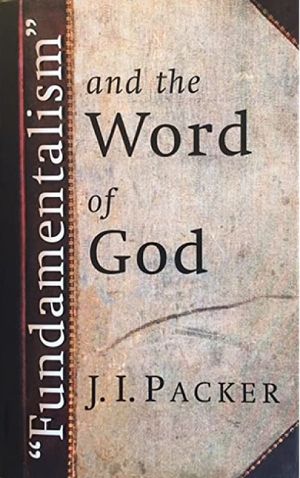When I was a teenager and asked questions about some points of Christian teaching my pastor behaved as though I was attacking him personally. I got no answers. Then I met a friend in school who told me that he had become a Christian that summer, and he invited me to Crusaders and to the Baptist church which his family attended. There I found a fellowship of people who encouraged discussion about the Bible, and were thinking about their faith.
During three years in the Royal Air Force my studies were guided by liberal books and teachers, and seeds of doubt were planted in my mind. I went to a college to train for the ministry asking how one makes decisions about truth, about what is right and wrong. How does one make any progress when meeting conflicting views put forward by supposedly equally clever men?
It was at that time, in the summer of 1958, that I bought for 22p a paperback entitled Fundamentalism and the Word of God by J. I. Packer. It has recently been reprinted by IVP for £1.99 and is excellent value. The previous year the SCM press had published a book called Fundamentalism and the Church of God by Gabriel Hebert in which he criticized the evangelical movement for two things: an inadequate doctrine of the Bible, and a proud attitude of spiritual self-sufficiency.
Hebert taught that the authority for what we believe is found in the pronouncements of the church. As I read Jim Packer’s book, light began to dawn. I saw there was this basic issue: Where did authority lie? With the changing convictions of denominations, with my fallible human reason or with the Word of God? If the Word of God was the absolute authority, then I had to submit my reason to the touchstone of Scripture. In fact if I held on to the authority of my own mind I would be displaying that attitude of spiritual self-sufficiency that the Anglo-Catholic Hebert attributed to evangelicals.
I read in J. I. Packer’s books these words: ‘What is the real nature of the choice with which this debate confronts us? It is not a choice between obscurantism and scholarship, nor between crudeness and sensitivity in biblical exposition. It concerns quite a different issue, and a far deeper one, although critics of Evangelicalism rarely seem to see it, or if they do, are shy of discussing it. The fact is that here we are faced in principle with a choice between historic Evangelicalism and modern Subjectivism; between a Christianity that is consistent with itself and one that is not; in effect, between one that is wholly God-given and one that is partly manmade. We have to choose whether to bow to the authority claimed by the Son of God, or whether on our own authority to discount and contravene a part of his teaching; whether to rest content with Christianity according to Christ, or whether to go hankering after a Christianity according to the spirit of our age; whether to behave as Christ’s disciples, or as his tutors. We have to choose whether we will accept the biblical doctrine of Scripture as it stands, or permit ourselves to re-fashion it according to our fancy. We have to choose whether to embrace the delusion that human creatures are competent to judge and find fault with the words of their Creator, or whether to recognize this idea for the blasphemy that it is and drop it’ (p.170).
It was these convictions that set me off in the direction that I have followed ever since, worshipping God with my mind and my heart.
Ken Mullis






